I’M THINKING OF ENDING THINGS (2020)
Full of misgivings, a young woman travels with her new boyfriend to his parents' secluded farm. Upon arriving, she comes to question everything she thought she knew about him, and herself.
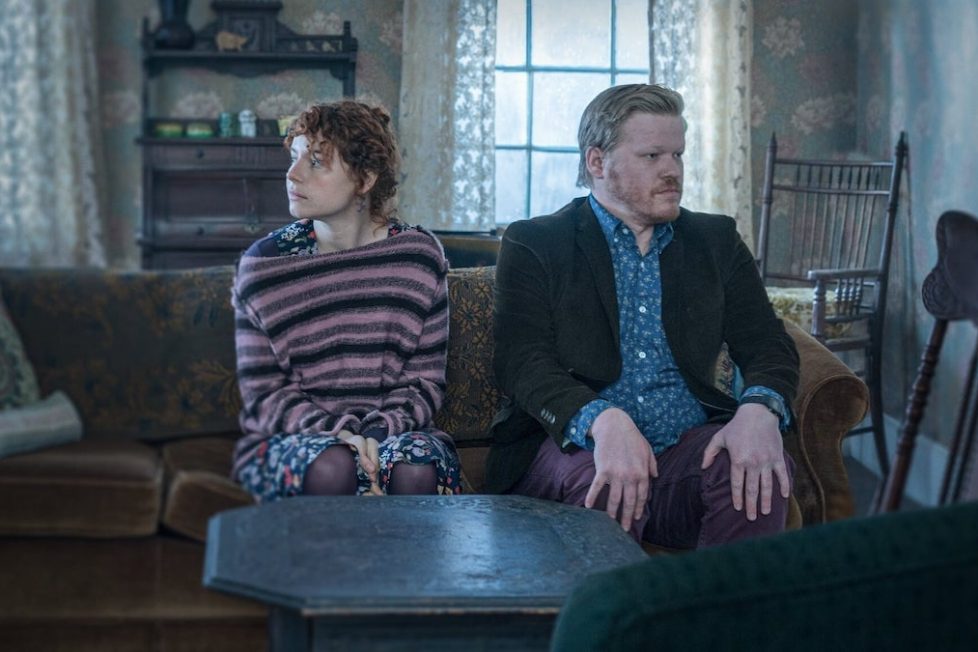
Full of misgivings, a young woman travels with her new boyfriend to his parents' secluded farm. Upon arriving, she comes to question everything she thought she knew about him, and herself.


In Charlie Kaufman’s I’m Thinking of Ending Things, almost nothing is what it seems. Indeed, by the end, one will question whether anything they’ve witnessed on-screen “really happened” in a literal sense. My guess is that around two-minutes near the end are intended to be taken as straightforward representations of events, but even that’s open to doubt in a film as strange, difficult, haunting, and addictive as Iain Reid’s 2016 novel.
The overwhelming unreliability of what we see and hear in I’m Thinking of Ending Things isn’t evident from the beginning, though. The film starts in a normal if sinister manner, with ominous music and a young woman’s voiceover accompanying shots of an empty house. Only later will we realise the character whose thoughts the monologue apparently represents, played by Jessie Buckley, never actually sees this house empty.
Soon the action proper starts, as the young woman—at this point called Lucy, although later her name seems to change several times—starts out on a trip with her boyfriend of a few weeks, Jake (Jesse Plemons). She’s going to visit his parents for the first time, and the couple’s drive through an Oklahoma snowstorm to the parents’ farm constitutes the first part of a movie that falls into four clear-cut sections.
They chat as he drives, but we continue to hear her thoughts too. “Jake is certainly hard to figure,” she muses. She hopes that maybe this expedition will help her to understand him better, but still, there is something “profoundly, unutterably, unfixably wrong” about Jake, and per the title, she’s thinking of ending things. (Like most things in Kaufman’s film, though, the title has at least one other meaning.)
The car journey takes about 20-minutes of screen time, almost exclusively focused on Plemons and Buckley. We barely even see through the windows, but we do cut to a school janitor at work, although his significance is unclear. This drive is only an overture to the much more significant second part of the film, at the parents’ house.
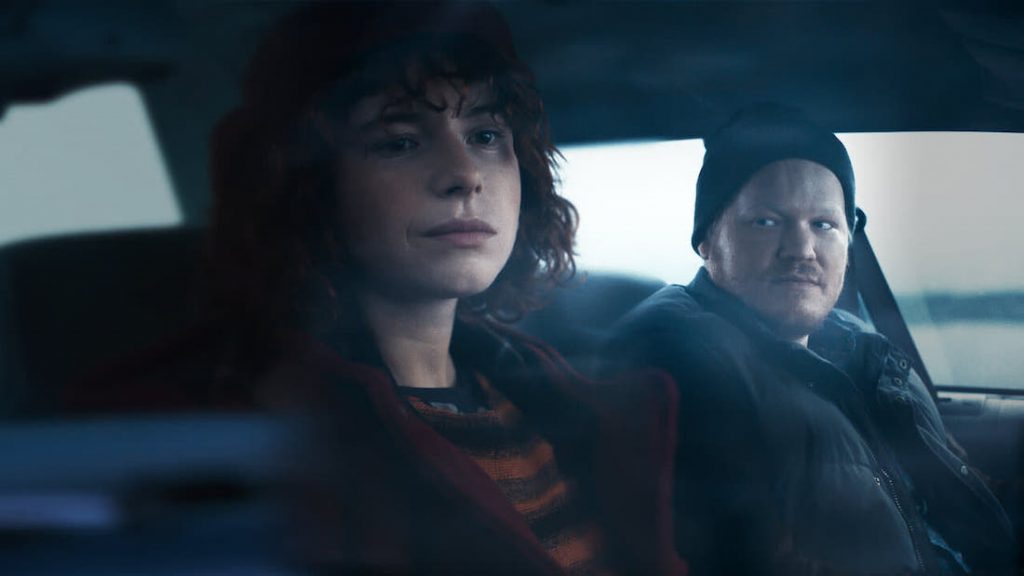
Here, some of the faint disquiet we might have felt at odd incidents in the car is magnified by one strangeness after another until, roughly an hour into the story, it’s clear that nothing in I’m Thinking of Ending Things is to be trusted.
The key moment, where the dream-like atmosphere that has been growing throughout finally takes full hold, occurs in Jake’s childhood bedroom (announced by a handwritten notice on the door reading “Jake’s Childhood Bedroom”): the young woman is looking through his books and videos, and among them we see what appear to be DVDs with home-made labels and titles like Futile Efforts at Success and Unforgettable Mishaps. Are we somehow not looking at the paraphernalia of Jake’s room, but at the contents of his mind? And if so, how did the young woman get in there?
Before this there have been plenty of disconcerting moments, though—moments where things aren’t quite impossible but are somehow wrong, many of them enhanced by the claustrophobic 4:3 aspect ratio that continually raises the question of what might be lurking outside the frame.
There’s the way the young woman, outside the farmhouse, and Jake’s mother framed in a window wave at each other for far too long. There’s the way that the family dog’s never seen until Jake mentions it to explain some scratches on the basement door, and then it appears instantly. Or there’s the way that, as with the waving mother, the wet dog shakes itself for so long. Or the way that Jake has said his parents don’t keep pigs any more, telling a gruesome story to explain why, and his mother (Toni Collette) has said everything on the dinner table comes from the farm… yet the centrepiece is a ham.
Nobody seems to eat anyway. Outside, snow falls on a vehicle but not on the grass around it. There are unnatural pauses in conversation. The young woman’s clothes and profession, like her name, change without explanation. (At one point later in the film she will even be played very briefly by a different actress, Colby Minifie.) Collette as Jake’s mother and David Thewlis as his father shift suddenly in age.
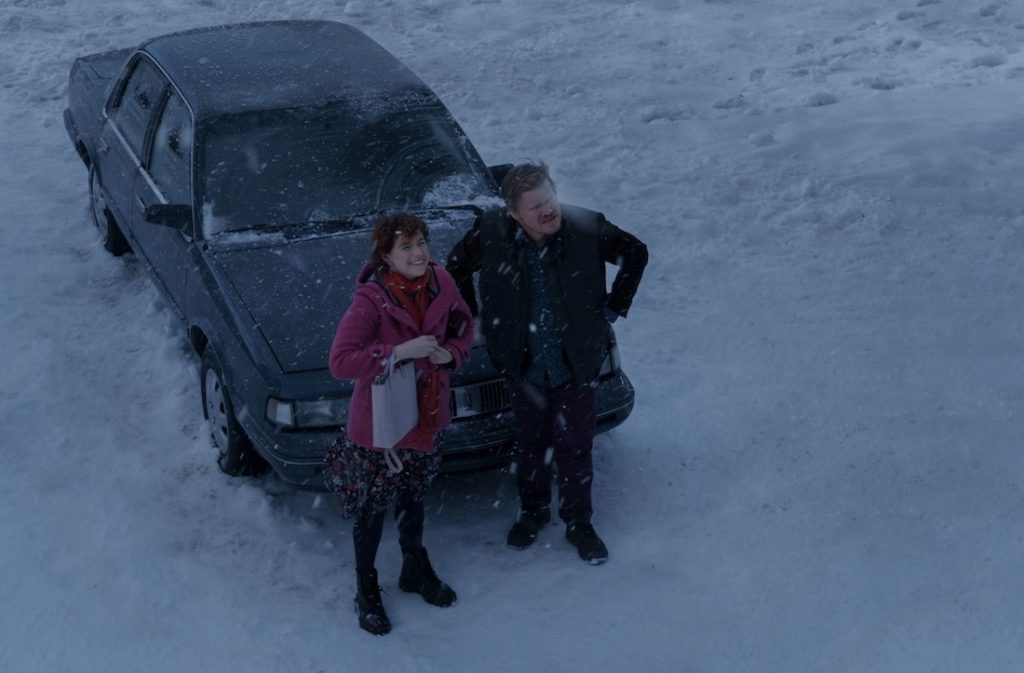
These jarring discontinuities are more obvious in the movie than in the novel, and by this point the Kaufman version of I’m Thinking of Ending Things is starting to feel distinctly like a horror story, even if we’re unsure exactly what the nature of the horror might be. And that impression is encouraged, too, by the magnificently nightmarish performances of Collette and Thewlis. He’s exaggeratedly friendly, but painfully literal-minded and frequently puzzled, to the point that he doesn’t quite seem to belong in the world; she alternates between grim silences and excessive effusiveness, erupting occasionally with inappropriate sniggers and giggles.
Equally strong, in very different and less baroque ways, are Buckley and Plemons. Buckley feels the most real character in the film, something which will prove ironic, and its tragic aspects are there to be seen all along in her face even if we’re not aware of them at first: she tries to look politely happy to be with Jake and meet his parents, but her expressions betray her doubts.
Plemons is as different from his casual-chic girlfriend as could be, deliberate and earnest and formal in his movements and speech (often recalling the late Philip Seymour Hoffman), somewhat buttoned-up most of the time, so solid and consistent that his occasional outbursts are shocks in contrast.
The evening at Jake’s parents’ house forms the second section of the film. It’s followed by another drive (in total about 50-minutes, or some 40% of the running time, is spent in the car with nothing going on but the snow outside and the Plemons-Buckley dialogue inside), and then a final section takes place at Jake’s old high school, a spookily huge and isolated institution which he insists on visiting in order to find a garbage can. They’ve bought ice cream on the way home (ice cream during a snowstorm!) and he can’t bear to keep the used containers in the car.
It’s another of the many, many clues Kaufman drops into I’m Thinking of Ending Things that the climax of the movie is brought about by Jake’s desire to dispose of waste properly. Suffice to say in this connection that the old janitor (Guy Boyd), who has already popped up occasionally, now becomes a character of importance. Boyd delivers this almost wordless role as well as the rest of the principal cast, his performance being much more in the larger-than-life Thewlis-Collette vein than in the more realistic Plemons-Buckley style. We can see the heavy mental weight he carries in the way he walks; when emotion overcomes him it’s genuinely disturbing.
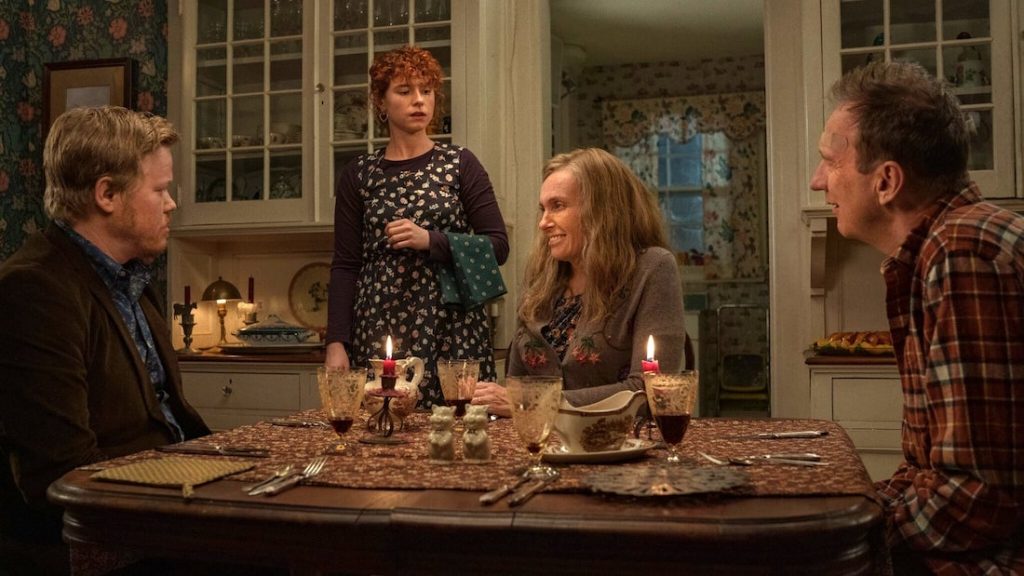
But despite how the midsection might have felt, I’m Thinking of Ending Things is not quite a horror movie. What we finally understand to be happening might be horrible in one sense, but in another, it’s just the kind of mundanely sad episode that goes on around us every day. In any case, for all that there is an element of empathy with the characters, Kaufman’s real concern—he wrote as well as directed, and departs considerably from the original novel in the final section, though less so before—is to explore questions of identity and reality, as he has done in so many films from Being John Malkovich (1999) through Synecdoche, New York (2008) to Anomalisa (2015).
This makes it difficult to write too analytically about I’m Thinking of Ending Things without spoiling its conclusion. This is not a gobsmacking, out-of-the-blue twist—many viewers will at least have a whiff of what’s going on, even if it takes some careful thought after the film has ended (and perhaps a second watch) to unpick exactly where reality stops and something else begins.
Perhaps it’s safe enough to say that the biggest trick up Kaufman’s sleeve is the way he exploits our assumptions concerning point of view: we believe we’re essentially seeing what Buckley’s young woman does, since we hear her interior monologue and generally are only privy to scenes where she’s present. The real point of view, however, is another character’s.
That may seem boggling, and indeed I’m Thinking of Ending Things makes less and less sense as it goes on—when the young woman says “I feel uncertain about a lot of what happened tonight”, we know the feeling! But the final passages do provide some clarity, and a certain poignancy that has drifted around the character of Jake throughout the movie coheres into a recognisable hurt.
They also highlight the possibility that a central character is less likeable than we had thought (self-obsessed, perhaps, or misogynistic); I’m Thinking of Ending Things isn’t an entirely bleak film, yet neither does it hold out much in the way of hope or comfort.
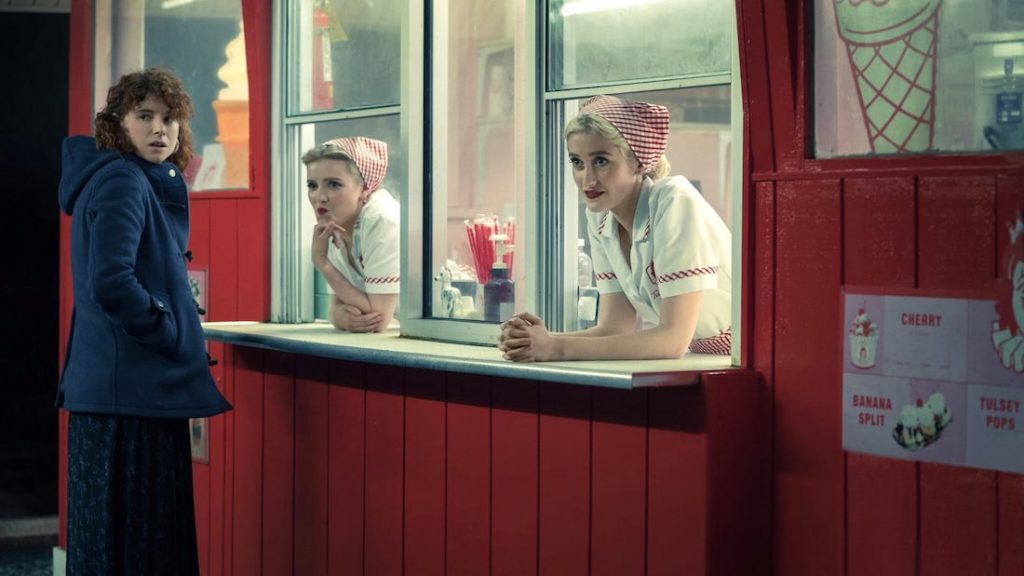
What it does do without fail is capture you in its puzzling world. There’s so much more I haven’t mentioned here—the musical number from Oklahoma!, the animated pig, the fake Robert Zemeckis movie, the overt allusions to A Woman Under the Influence (1974) and A Beautiful Mind (2001), as well as David Foster Wallace’s book A Supposedly Fun Thing I’ll Never Do Again.
All three of those titles are clues in their way. So, too, are lines that can be given multiple interpretations like Jake’s reference to “my high school, where I spent every tortured day for so long” or his mother’s comment that “Jake can be controlling”. And then there are other connections that the film seems to invite us to make but aren’t so graspable: the mother hears voices, a stranger repeatedly leaves cryptic voicemails for the young woman.
The fact that their meaning is not spelt out is a strength, perhaps the most important strength, of I’m Thinking of Ending Things. Where the narrative of most movies is clear-cut and more or less logical, here it’s much more like the interior narrative of our own minds: patterns are discernible, general directions can be felt, but not all knowledge is certain and not all emotions are unambiguous.
The dots are pretty much joined by the time it’s all over—Kaufman’s film is not just a giant unanswered question, and seemingly chaotic elements are assembled with great care—but what stays with you is the disorientation, the impression of things being both real and unreal at the same time. Add in a screenplay that’s bursting with unexpected turns of dialogue, a quintet of great performances, and some understatedly gorgeous photography from Łukasz Żalv, and the result is nearly a masterpiece, unsettling and weird yet thoroughly human at its core too.
USA | 2020 | 134 MINUTES | 1.33:1 | COLOUR | ENGLISH

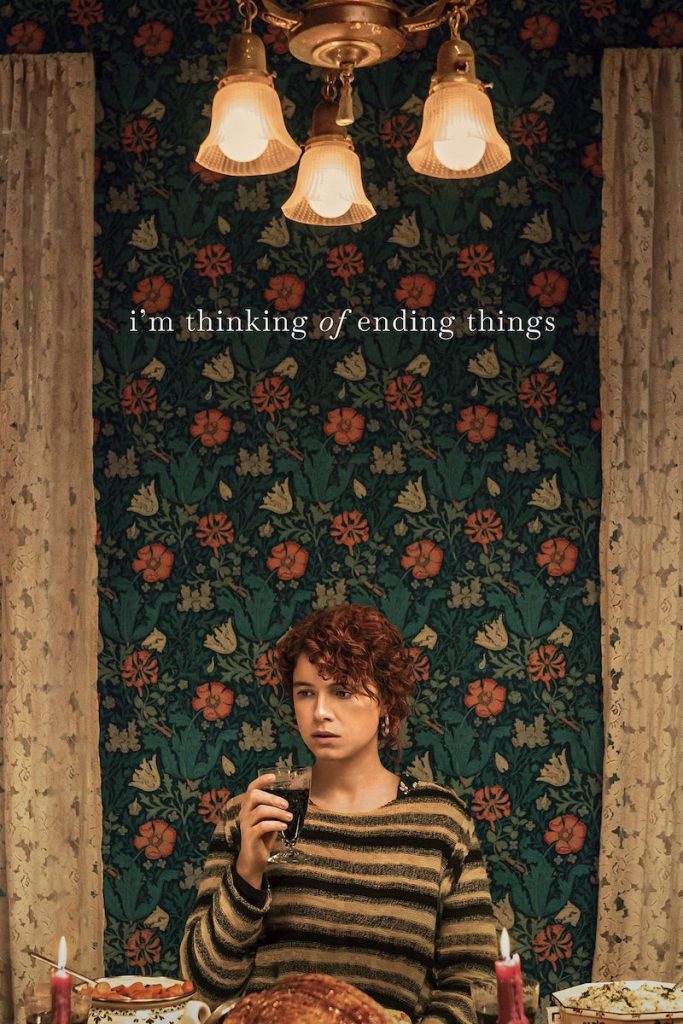
director: Charlie Kaufman.
writer: Charlie Kaufman (based on the book by Iain Reid).
starring: Jesse Plemons, Jessie Buckley, Toni Collette, David Thewlis, Guy Boyd, Colby Minifie, Jason Ralph, Teddy Coluca & Oliver Platt.
